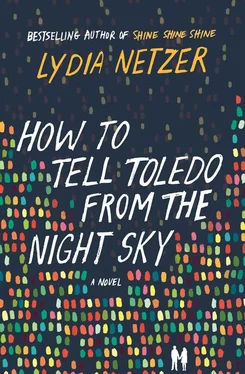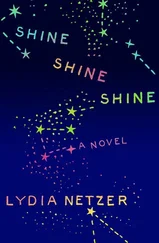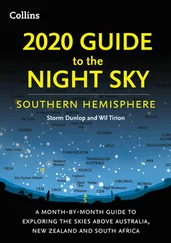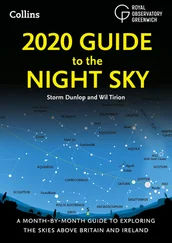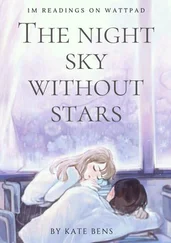“She’s here in her home, and I’m with her. Honey, she appears to have fallen down the stairs.”
“Are you sure she is dead? Did somebody really check? She can be—a deep sleeper,” said Irene. Her tears were now making her face wet. Irene used her hand to swab her eyes. She used her lab coat, leaving a rumpled wet patch on it. She began to flick switches on the control panel, powering down, shutting everything off. She was thinking off, off, off as she clicked the metal switches.
“Yes, I’m sorry. It seems that—” Here he coughed. Blake Allen was pastor of the Unitarian Church. Her mother attended weekly, prayed with a prayer circle, knitted shawls for the bereaved. Of course, she also practiced palm reading, tarot, and other astrological divinations. The recitation of liturgy, the meditative chants, altar clothes, tie-dye with bells, a crystal ball, a chalice. All the accoutrements of firm belief. “It seems that the neighbor came by to see her. I guess they usually had afternoon tea together. Anyway, she found her.”
“Are you telling me she’s lying on the floor at the bottom of the stairs?”
“Yes, but the coroner will take her away soon. I want you to know that I’m going to take care of whatever needs to be taken care of here. Don’t worry about anything like that.”
Irene paused. She felt like there was too much oxygen in the room. Her lungs just kept filling up and replenishing her oxygen supply and then going back, inexorably, for more oxygen. It was like the damn brooms at the well. She could see her mother, curled innocently on the floor next to the bottom step, one hand closed under her chin, one fist open, palm exposed, as if to say, “Come with me.”
“Is she broken? Did she break—” Irene began to cough.
“We don’t know the cause of death. She may have had a stroke at the top of the stairs, a heart attack, we just don’t know.”
There were times when her mother would say, I’m dying. I need to get a haircut and make a will. Irene would just roll her eyes at that. That was before Irene had said, I am leaving Toledo and I will never come back. I will never speak to you again.
“I’m so, so sorry. I know you and your mom were not close,” said the rector.
“We were close,” said Irene. She choked back a sob.
“Of course, of course. She spoke of you so often.”
The rector said a few words to someone else in the room there in her mother’s house in Toledo. She imagined him stepping nimbly over the corpse of her mother, trotting adroitly over to the front door, stepping out onto the porch. She could hear traffic sounds. He was probably wearing a bespoke suit. He was such a natty dresser.
“I don’t want to come home,” said Irene stupidly. She didn’t know what else to say.
“Really?” Blake Allen wanted to know. “Your mother always said it was your dream to come back to Toledo.”
Her dream was to come back to Toledo, and work at the Toledo Institute of Astronomy. But it was not something she could ever do while her mother was there, or while her experiment was unsuccessful. But now …
“I don’t—” Irene began.
“Irene, excuse me for one moment,” said Blake Allen. He put his hand over the phone and Irene waited, listening to the silence on the line, feeling her heart tap against her ribs in an irregular rhythm. I need to sit down, she thought. I’m going to have a heart attack, too. I’m going to fall down some stairs.
“Irene, I’ve just talked to the coroner. From what he was able to determine, sweetie, there was no suffering in the end.”
“Was she just tired or was she confused or was she—” Irene wanted to say drunk, but that was not something she would ever say out loud. Still, her mind would not comply: Was she blasted? Wasted? Hammered? Was she? Was she like, “Whee! Down we go!”
“Sweetie, we just don’t know. We don’t know. Listen, I need to speak to some people here that have just arrived. I will call you again later.”
Irene turned the phone off and put it down. There was a dense, strange feeling in her chest, like the residual joy at having successfully observed results in her experiments had collided with the grotesque horror of having her mother die of a broken neck, and a black hole had been created in the center of her chest, sucking in all her feelings and her will. She began to cry. She sat down in her chair and put her hands in her lap, coughing and sobbing.
Does death always make you feel sad? What do you do when someone dies? What if the person was a terrible and unsolvable lifelong problem for you? What if the person was your mother?
Irene cried and cried, in spite of herself. Her mother had been a bad mother, yet she was sad anyway. She couldn’t make the sadness stop, just because it was reasonable to feel relief. She tried to figure out what she would say to someone else in this situation. Maybe the years of awfulness dissolve, when a bad mother dies, so that all you really have to feel is sadness. Or maybe Irene would say to the person, “I’m sorry for your loss,” and that would be the end of it.
Exhausted from her tears, Irene finally looked up and saw her gleaming machine. She remembered the good thing that had happened to her, and what she must now do. Then she gathered her backpack and keys and went outside the lab and up the stairs. She did not fall. She did not die. She locked the door.
Outside, she saw it was midafternoon. The blue autumn sky seemed to hover just above the colorless buildings. The breeze felt cool but there was warmth radiating off the pavement all around. She felt sure it was a Monday. A rumbling of shouts came from the stadium, and she knew there was a sports practice going on there. A group of men shouting rhythmically as they ran forward, sideways, backward, or hunched in squats. Irene opened her phone and placed a call to the Toledo Institute of Astronomy. On the phone, her tone was full of spirit.
The Toledo Institute of Astronomy was founded in 1837 as the Stickney Library of Almanacs (or al-manakhs) by Angelica Stickney, whose family’s fortune had been made in shipping, and whose lifelong passion was observing the night sky. She employed two full-time academics in her library. The more elderly of them, Dr. Claude Pooley, had been hired to study and catalog the information in Mrs. Stickney’s astonishing collection of almanacs, from a tablet of Sumerian origin depicting planetary movements to a document from the sixteenth century that was believed to have been penned by Francis Bacon. The other scientist in her employ, self-taught female prodigy Esther Birchard, was charged with studying stars and weather patterns in order to better inform the decisions made by the Stickney family’s transportation business, which operated largely on the Miami and Erie Canal and its Wabash extension. Birchard’s husband was an elevator man. He was a naturally suspicious person.
Pooley, the librarian, enlightened by the study of ancient texts and tables, became involved in light experiments postulating the chemical composition of the sun. He had such success with his observations that he began to publish his work and bring in other researchers to work with him. On the other side of this dual operation, Stickney Carriers laid unfortunate claim to the record for most vessels lost in the river to storms, mechanical failures, and crime. Esther Birchard, whose job it was to advise the captains of these boats, grew more and more reclusive, as her predictions increasingly failed. Year by year, she found herself relying less on her anemometer and more on fervent prayer to improve the fates of the company. Eventually, she lost her job. When pressed to account for this, Angelica Stickney calmly explained that Esther Birchard was a weather witch, and had accordingly been banished from the company. Her husband almost immediately fell down an elevator shaft and died, leaving behind a curt note to his children that his wife was not to blame. Esther Birchard was not seen or heard from again.
Читать дальше
